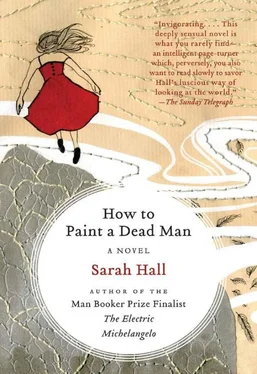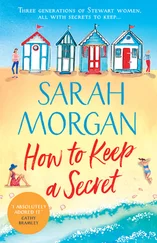Sarah Hall - How to Paint a Dead Man
Здесь есть возможность читать онлайн «Sarah Hall - How to Paint a Dead Man» весь текст электронной книги совершенно бесплатно (целиком полную версию без сокращений). В некоторых случаях можно слушать аудио, скачать через торрент в формате fb2 и присутствует краткое содержание. Год выпуска: 2009, Издательство: Harper Perennial, Жанр: Современная проза, на английском языке. Описание произведения, (предисловие) а так же отзывы посетителей доступны на портале библиотеки ЛибКат.
- Название:How to Paint a Dead Man
- Автор:
- Издательство:Harper Perennial
- Жанр:
- Год:2009
- ISBN:нет данных
- Рейтинг книги:4 / 5. Голосов: 1
-
Избранное:Добавить в избранное
- Отзывы:
-
Ваша оценка:
- 80
- 1
- 2
- 3
- 4
- 5
How to Paint a Dead Man: краткое содержание, описание и аннотация
Предлагаем к чтению аннотацию, описание, краткое содержание или предисловие (зависит от того, что написал сам автор книги «How to Paint a Dead Man»). Если вы не нашли необходимую информацию о книге — напишите в комментариях, мы постараемся отыскать её.
, Sarah Hall, "one of the most significant and exciting of Britain's young novelists" (
), delivers "a maddeningly enticing read... an amazing feat of literary engineering" (
).
How to Paint a Dead Man — читать онлайн бесплатно полную книгу (весь текст) целиком
Ниже представлен текст книги, разбитый по страницам. Система сохранения места последней прочитанной страницы, позволяет с удобством читать онлайн бесплатно книгу «How to Paint a Dead Man», без необходимости каждый раз заново искать на чём Вы остановились. Поставьте закладку, и сможете в любой момент перейти на страницу, на которой закончили чтение.
Интервал:
Закладка:
The electric doors of the train beeped and closed. People made their way along the aisles looking for reservations, bumping luggage against the armrests, hauling it into seat wells and the overhead racks. You put a hand out to steady the bottle as it rocked on the table. Yeah, you thought, gold star from the Caldicutt school of flimflam, fable and fabrication.
You did swallow his stories once. When you were a kid you bought the whole lot, every last word. Flying in Leonardo’s helicopter. Marching with Martin Luther King. Singing with the Beatles. The heroes, the nutcases, the flophouses. And later, the parties, the busts and arrests, those big-haired, Afghaned comrades of a bygone era.
The big man. He was so full of vim, so experienced, so full of life’s banquet. To you it seemed he had tasted the wares of the world. You knew you could never live like him, even if you tried. He was too potent, too hungry. No wonder your mother had to be sage. It was probably a reactionary measure, designed to give you and Dan balance. Where your dad was as effervescent as his berry hock, which often exploded on the pantry shelves, she was a spirit level. You remember her charting the water table and the ley-lines. Quartering withered apples to feed the fell ponies over the garth wall. She had devices that hung in the garden to measure rainfall, air pressure, and wind speed, tubes that sang and gurgled, emptied and filled. Inside was her kitchen of pies and soups and breads, her known recipes, her faith in the ingredients.
You were once theirs, as Danny was theirs. The fertilisation of bilateral ova. Sometimes it seems unbelievable. That remarkable double spark. The celestial, genetic chance of you and he, playing thumb-wars in the womb, doing an amniotic slow dance, and making yourselves from the pattern they gave you.
You could probably tell them everything, about how you feel, or don’t feel. You could say that your home life is deteriorating rapidly, that you are being unfaithful. You could say you can’t work any more, that you can’t even develop the last roll of film in your Leica because Danny is on it and you can’t bear to see him, on the bench outside Euston with pigeons at his feet. You can’t bear to be reminded that only a few months ago he was walking naked round your flat, showing Nathan some juvenile trick with his cock, making chocolate pizza to thank you for your hospitality, making you laugh. You could say to your mum and dad that you are in such serious trouble, in such decline, you are so unbearably alone and undefined, that you can’t operate normally. You could say that without Danny you are imbalanced, you have no real identity, you are not really Susan.
Maybe they would tell you what to do, or who you are. Maybe they would remind you that you have always been the strong one, always wilfully yourself, despite the pronouncements of Dr bloody Dixon. They would say that you have control over your relationships, and that you are a professional artist. They would remind you of the time you sneaked into your dad’s studio as a kid and applied some white acrylic to a painting he was doing. One rebellious brush stroke in the upper left corner. You waited a few days, braced for discovery and a row of epic proportions. But he didn’t notice. All he did was rove about the house in the kilt he was currently favouring and sing in the bath and drink homebrew. Later you went back into the studio and the mountain had advanced in composition. The flat crescent summit appeared sturdy enough to support another world if one had been set down upon it. It looked like an authentic Caldicutt. Annoyed, you confessed. You didn’t say you were sorry. You just said you’d done it. Oh, bloody hell, sweetheart, he said, it was exactly the thing it needed.
Of course they would sympathise. They love you. But they can’t fix you, can’t make you yourself again. No more than sex can shock your atoms, make them come alive. No more than Dr Dixon’s therapy could make of you a first person. You are comprised of a million tiny locks. There’s no master key to be found, encased in the plush velvet heart, no matter how desperately you ask someone to reach in and grope around. No matter how hard you try to find it.
You put the bottle away as the train began to move, and you watched the familiar old town slip away, its red masonry lost behind you, the river, the peel tower, the henge. You took out your mobile. Already other people were chatting to those they had just left or those they would soon see, oblivious to the Quiet Carriage signs. You scrolled through your list of contacts. You passed over Angela, Danny and Nathan. When you arrived at Tom’s number you paused, then pressed the green call button. There were enough rings for you to guess he was finding a quiet room in Borwood House before answering. Pronto. Are you coming back down today? I miss you. Can we meet? I’ll come in. I’ve got something to tell you. The train sped up and began to lean into its corners, the plastic bulkheads squeaking and wobbling, and the phone signal cut out. You drafted a text, telling him the name of a hotel and where to meet. You watched the country roll past. The hills and cellars of cloud, the flat, grey Irish Sea, then mill town skylines, chimneys, canals, and terraces, small back gardens filled with bin bags and scrap metal, prams and bicycle frames.
Translated from the Bottle Journals
I have not known Theresa to be a sentimental woman, but yesterday I found her weeping beside the tomatoes. A handkerchief was pressed tightly to her mouth. She was weeping with a terrible distress, as a parent might if their child stood before them with a suitcase in their hand, having taken a vow to enter a monastery. She was weeping for me. This morning we received a letter from the hospital. I do not know if it was solely this news that upset her or if Theresa was weeping with a private grief. I know, for example, that she misses her father.
In any case, we have been waiting for the news and the cancer is confirmed. It is not a surprise. I believe we all anticipated it, but Theresa is still a young woman and she is less reconciled to the inevitabilities of later life. I have been trying to continue with my work. I want to finish the new painting before winter. I am pleased with the arrangement of objects on the table. The measurements are exact, and the canvas is ready, but the easel remains unscrewed and turned away and I have stalled. Perhaps I am not immune to morbidity, as I would like to believe I am.
The sound of her crying in the garden was so unusual that I thought at first a bird was defending its nest from a predator. But she had left the house to grieve, trying to be discreet. Any compassion at my disposal is always tempered with an awareness of how absurd life can be. Theresa might have found more consolation in her work, for I am afraid I was not much use to her, and perhaps said the wrong thing. I wonder does she imagine me to be a lonely man? Does she underestimate the life I have lived and the pleasure I have derived from it? Of course I could not ask her simply to stop. A weeping woman has no desire for opposition; she wants only to know her sadness is correct on the occasion of her expressing it. All will be well, I said to her. Let us find some perspective on our little situation. In Spain this year they ran the bulls and twenty men were trampled. In Argentina penguins are swimming under the ice sheets instead of breeding. There are wars on the other side of the world and I am seventy-eight. She only wept harder. I said to her, come, my dear Theresa, we will forget our chores and retrieve our coats from their hooks and we will visit the aviary in the city. We will take the train like proud citizens of Italy! Today I am well. Today we will go. I pressed her hands between my own and she appeared to recover quickly, and I felt for the first time her hands made rough by continual work.
Читать дальшеИнтервал:
Закладка:
Похожие книги на «How to Paint a Dead Man»
Представляем Вашему вниманию похожие книги на «How to Paint a Dead Man» списком для выбора. Мы отобрали схожую по названию и смыслу литературу в надежде предоставить читателям больше вариантов отыскать новые, интересные, ещё непрочитанные произведения.
Обсуждение, отзывы о книге «How to Paint a Dead Man» и просто собственные мнения читателей. Оставьте ваши комментарии, напишите, что Вы думаете о произведении, его смысле или главных героях. Укажите что конкретно понравилось, а что нет, и почему Вы так считаете.












